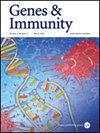Myeloid derived suppressor cells mediate hepatocyte proliferation and immune suppression during liver regeneration following resection
IF 4.5
3区 医学
Q1 GENETICS & HEREDITY
引用次数: 0
Abstract
Liver regeneration following resection is a complex process relying on coordinated pathways and cell types in the remnant organ. Myeloid-Derived Suppressor Cells (MDSCs) have a role in liver regeneration-related angiogenesis but other roles they may play in this process remain to be elucidated. In this study, we sought to examine the effect of G-MDSCs on hepatocytes proliferation and immune modulation during liver regeneration. Global gene expression profiling of regenerating hepatocytes in mice with CD11b+Ly6G+ MDSCs (G-MDSCs) depletion revealed disrupted transcriptional progression from day one to day two after major liver resection. Key genes and pathways related to hepatocyte proliferation and immune response were differentially expressed upon MDSC depletion. Hepatocytes cellularity increased when co-cultured with G-MDSCs, or treated with amphiregulin, which G-MDSCs upregulate during regeneration. Cytometry by time-of-flight (CyTOF) analysis of the intra-liver immune milieu upon MDSC depletion during regeneration demonstrated increased natural killer cell proportions, alongside changes in other immune cell populations. Taken together, these results provide evidence that MDSCs contribute to early liver regeneration by promoting hepatocyte proliferation and modulating the intra-liver immune response, and illuminate the multifaceted role of MDSCs in liver regeneration.

髓系衍生抑制细胞在肝脏切除后的再生过程中介导肝细胞增殖和免疫抑制。
肝脏切除后的再生是一个复杂的过程,依赖于残余器官中协调的途径和细胞类型。髓系衍生抑制细胞(MDSCs)在肝脏再生相关的血管生成中发挥作用,但它们在这一过程中可能发挥的其他作用仍有待阐明。在这项研究中,我们试图研究 G-MDSCs 在肝脏再生过程中对肝细胞增殖和免疫调节的影响。对CD11b+Ly6G+ MDSCs(G-MDSCs)耗竭的小鼠再生肝细胞进行的全基因表达谱分析显示,从肝脏大部切除后的第一天到第二天,转录过程出现了紊乱。与肝细胞增殖和免疫反应有关的关键基因和通路在 MDSCs 耗竭后出现了不同程度的表达。当肝细胞与G-MDSCs共培养或用安非他酮处理时,肝细胞的细胞性增加,而G-MDSCs在再生过程中会上调安非他酮。通过飞行时间细胞计数法(CyTOF)分析再生过程中MDSC耗竭后肝脏内的免疫环境显示,自然杀伤细胞比例增加,其他免疫细胞群也发生了变化。综上所述,这些结果证明了 MDSCs 通过促进肝细胞增殖和调节肝内免疫反应促进了早期肝脏再生,并阐明了 MDSCs 在肝脏再生中的多方面作用。
本文章由计算机程序翻译,如有差异,请以英文原文为准。
求助全文
约1分钟内获得全文
求助全文
来源期刊

Genes and immunity
医学-免疫学
CiteScore
8.90
自引率
4.00%
发文量
28
审稿时长
6-12 weeks
期刊介绍:
Genes & Immunity emphasizes studies investigating how genetic, genomic and functional variations affect immune cells and the immune system, and associated processes in the regulation of health and disease. It further highlights articles on the transcriptional and posttranslational control of gene products involved in signaling pathways regulating immune cells, and protective and destructive immune responses.
 求助内容:
求助内容: 应助结果提醒方式:
应助结果提醒方式:


